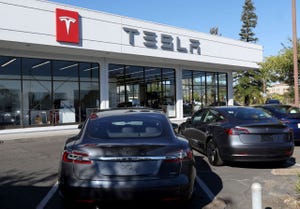General Motors Banned From Selling Driving DataGeneral Motors Banned From Selling Driving Data
FTC ban follows allegations GM collected, used and sold information from millions of vehicles with notifying customers

General Motors and its OnStar subsidiary have been banned from selling customer driving behaviour and geolocation data in the United States for five years.
The measure was announced in a statement by the Federal Trade Commission (FTC), which said it had acted amid allegations that GM had collected, used and sold information from “millions of vehicles, without adequately notifying consumers and obtaining their affirmative consent.”
This data, which covered specifics such as journey lengths and how cars were driven (down to instances of hard braking and extreme acceleration), could be used to set insurance premiums.
And as an investigation by the New York Times discovered, that was exactly what was happening, with data being sold to insurers and third-party data brokers.
This resulted in some customers receiving higher than expected premiums without knowing why. As the FTC statement revealed: “One consumer told a GM customer service representative that “[w]hen I signed up for this, it was so OnStar could track me. They said nothing about reporting it to a third party. Nothing. […] You guys are affecting our bottom line. I pay you, now you’re making me pay more to my insurance company.”
As cars get ever more connected, how much they know about their owners is becoming an increasing concern, particularly in the case of geolocation data. It can provide a forensic insight into the micro-particulars of someone’s life by revealing where they have been at all times – which, if misused, could have serious consequences.
The FTC acknowledged that this was the first time it has had to act in relation to connected vehicle data, but said it was doing so to safeguard “Americans’ privacy” and protect people from “unchecked surveillance.”
OnStar was pitched by GM as a service that could help in an emergency, as well as provide hands-free voice assistance and real-time traffic and navigation. It included a Smart Driver feature that was supposed to assess their habits and encourage safer driving.
However, the FTC alleged that GM’s enrollment procedure was “confusing and misleading” and some people were unaware they had signed up for Smart Driver. GM was also accused of not making it clear that the data collected was being sold to consumer reporting agencies.
Under the FTC’s proposed order, which will have to be ratified by a court, GM cannot now disclose data to consumer-facing agencies; must gain consent from consumers prior to collection; allow consumers to obtain and delete their data; and allow consumers to limit data collection.
In a statement responding to the FTC, GM said it discontinued Smart Driver last year and had now stopped selling data to analytics companies LexisNexis and Verisk.
It added: “The FTC consent order includes new measures that go above and beyond existing law, while capturing steps we’ve already taken to establish choices for customer data collection and communications about how the information is used. Respecting our customers’ privacy and earning their trust is deeply important to us.”
About the Author
You May Also Like








